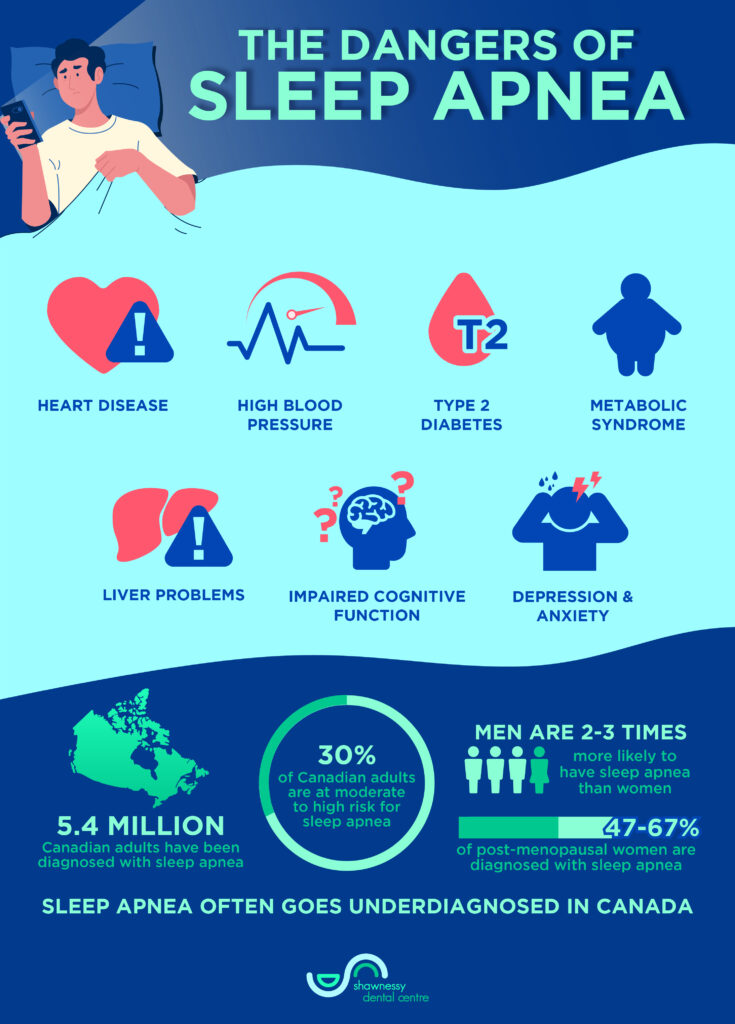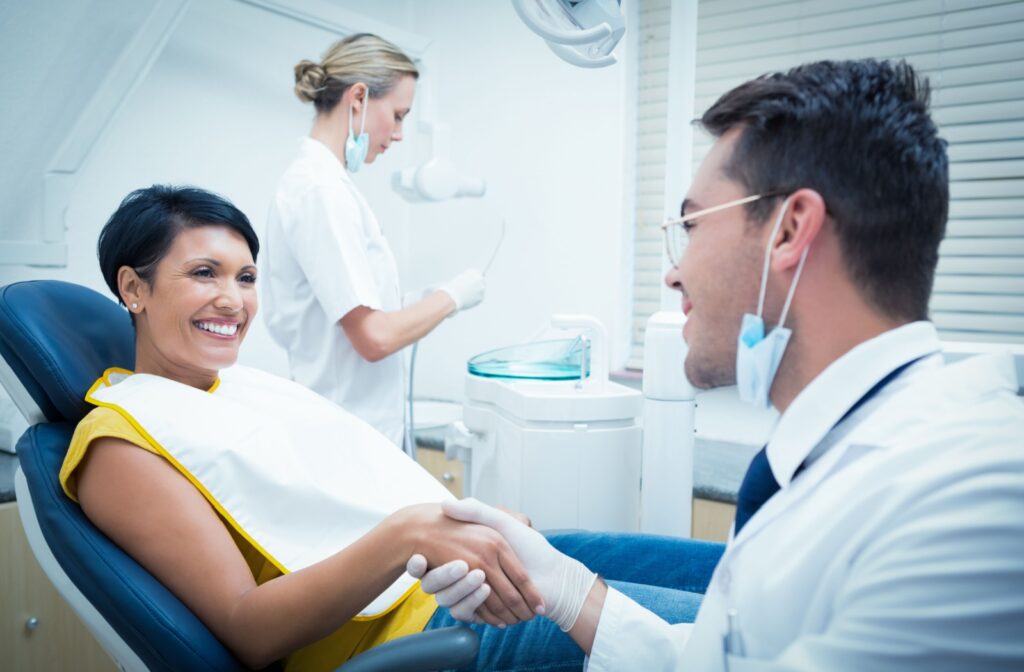Sleep apnea is a condition that periodically causes pauses in breathing while you sleep. As a survival reflex, your brain will wake you up to make you start breathing, but this interrupts your sleep and prevents healthy rest. Additionally, when you continuously stop breathing, your body doesn’t get the oxygen it needs to function correctly. Between losing sleep and lack of adequate oxygen, you may feel exhausted throughout the day and are at a higher risk of numerous health complications.
Many people are unaware of the dangers of sleep apnea, which means the condition often goes undiagnosed and untreated. But if unaddressed for long enough, sleep apnea can contribute to heart disease, diabetes, cognitive decline, and other long-term health risks.
Your dentist can help manage sleep apnea symptoms to mitigate the associated risks and reduce your symptoms, improving your much-needed sleep.
What Causes Sleep Apnea?
There are 2 primary types of sleep apnea: obstructive sleep apnea (OSA) and central sleep apnea (CSA).
- OSA is the most common type of sleep apnea and occurs when something blocks your upper airway while you sleep. Anything that restricts your airway can contribute, including underbites, obesity, large tonsils, large tongue, or a large neck circumference.
- CSA is less common and occurs when your brain doesn’t send signals to breathe. Certain underlying health conditions can lead to CSA.
Symptoms & Risk Factors of Sleep Apnea
One of the most common sleep apnea symptoms is loud snoring (although it’s not always a symptom), often accompanied by gasping or choking, usually noticed by your bed partner. Snoring and gasping are caused by the airway becoming partially or fully blocked during sleep, resulting in laboured breathing.
Those with sleep apnea may also experience:
- Daytime sleepiness
- Morning headaches
- Difficulty concentrating
- Irritability or mood swings
- Dry mouth
- Loud snoring followed by silent pauses
- Gasping or choking during sleep
Certain factors can increase a person’s risk of developing sleep apnea, including:
- Excess weight, especially around the neck
- Age, especially those over 40
- A family history of sleep apnea
- Nasal congestion or obstruction
- Smoking
- Alcohol use
If you believe you may be at risk for sleep apnea, discussing this with your doctor and taking steps to mitigate your risk is important.
What Can Happen If Sleep Apnea Goes Untreated?
Sleep apnea can lead to more serious health problems if left untreated, increasing the risk of developing several life-threatening conditions. Those with sleep apnea may also be at a higher risk of accidents, as they’re more likely to fall asleep while driving or operating heavy machinery.
Heart Disease & High Blood Pressure
You’re at a higher risk of high blood pressure if you have sleep apnea, as it causes an increase in both systolic and diastolic blood pressure levels when breathing stops. Your blood pressure may remain elevated throughout the day, even if you’re breathing normally, due to an overactive sympathetic nervous system, stress-related changes in blood vessels, and inflammation.
Sleep apnea also increases your risk of heart disease, stroke, and other cardiovascular problems caused by the strain put on your heart and blood vessels from repeated drops in oxygen levels. Studies reveal that people with sleep apnea are 2 to 3 times more likely to develop heart disease and are twice as likely to have a heart attack compared to those without it.
Type 2 Diabetes
Sleep apnea and diabetes have a complex relationship: one seems to worsen the other. If you have diabetes, you’re at an increased risk of developing sleep apnea. If you have sleep apnea, you’re at an increased risk of developing type 2 diabetes.
Reports show that diabetes affects the control of our breathing, which is believed to contribute to OSA. These findings suggest a connection between sleep problems and type 2 diabetes, regardless of age or weight.
Conversely, sleep apnea can affect blood sugar levels. When your body doesn’t get enough oxygen, the amount of carbon dioxide in your blood increases. This can cause insulin resistance to go up as well, leading to higher levels of glucose (sugar) in your blood. If this happens for a long time, your A1C levels can also increase. The higher your A1C, the greater your risk for type 2 diabetes.
Metabolic Syndrome & Liver Problems
A drop in oxygen triggers a cascade of physiological changes, including releasing stress hormones like cortisol. Stress hormones promote inflammation and insulin resistance, key components of metabolic syndrome. Low oxygen levels can also disrupt the metabolic processes in the liver, contributing to non-alcoholic fatty liver disease.
Metabolic syndrome is characterized by high blood pressure, high blood sugar levels, abnormal cholesterol levels, and excess abdominal fat and is linked to a higher risk of heart disease.

Impaired Cognitive Function
Unsurprisingly, losing sleep every night can impact your energy during the day, leading to excessive sleepiness. But what may be surprising is this loss of quality sleep can lead to problems with thinking, attention, memory, and problem-solving.
Depression & Anxiety
Mental health isn’t immune to the effects of untreated sleep apnea, either. Sleep apnea can leave you feeling tired, irritable, and moody. This chronic sleep deprivation can also lead to depression and anxiety in some individuals.
How Is Sleep Apnea Diagnosed?
If your doctor suspects you have sleep apnea, they’ll perform several tests to give you an accurate diagnosis. Some of these include:
- A physical examination: Your doctor may give you a physical to check for risk factors of sleep apnea, such as enlarged tonsils or a narrow airway.
- A sleep study (polysomnography): During this study, your sleep patterns, heart rate, breathing, and other vital signs are monitored to determine if there are any disruptions or abnormalities in your sleep cycle.
- An at-home sleep apnea test: This test involves using portable devices to measure various parameters while you sleep in the comfort of your own home. These devices track breathing patterns, oxygen levels, and other indicators of sleep apnea.
How Is Sleep Apnea Treated?
While there’s no cure for sleep apnea, managing your sleep apnea can help prevent or reduce how often apnea events occur or how severe they are. Any therapies you undergo should become part of your daily routine to minimize sleep apnea’s effect on your quality of life.
Management options include:
- Lifestyle changes: Making certain lifestyle modifications, such as losing weight, avoiding alcohol and sedatives, and sleeping on your side instead of your back, can help alleviate symptoms.
- Positive airway pressure (PAP) therapy: PAP machines increase the pressure inside your upper airways to keep them open while you sleep. The most well-known PAP machine is the Continuous Positive Airway Pressure (CPAP), but there are others available.
- Oral appliances: OSA can be managed with devices that reposition your jaw and tongue to keep them from putting pressure on your airway. These custom-made devices can be supplied by your dentist.
- Positional therapy: This approach involves using various devices or techniques to encourage you to sleep in positions that reduce sleep apnea events. Some examples include special pillows, tennis balls, or alarms that vibrate when you roll onto your back.
- Surgery: In severe cases of OSA or if no other method is helping, you may be referred for surgery. There are different types of sleep apnea surgery, but most aim to remove excess tissue, correct structural abnormalities, or improve airway passage. Surgery can eliminate or improve sleep apnea, so you don’t need other management devices.

Manage Sleep Apnea with Shawnessy Dental Centre
Sleep apnea is a serious health problem that often goes undiagnosed and untreated. And when left untreated, it can lead to severe health conditions that impact your quality of life and can become life-threatening. It’s essential to seek medical advice if you suspect you have sleep apnea. Treatment options are available.
At Shawnessy Dental Centre, we can provide sleep apnea therapies, including snore guards or PAP machines. Our goal is to help you manage your symptoms so you can achieve more restful sleep and reduced health risks.


